The Twilight Zone is one of my favorite television series of all time. If you’ve been following along with my “Small-Screen 66” series, you can expect it to earn a place of honor. Arguably the greatest anthology series ever made, the show is packed to bursting with creepy creatures, unforgettable twists, and man’s inhumanity to man. No critic will deny it deserves a place in the pantheon of classic TV. But not all episodes are created equal. Ask anyone about the series, and chances are good they’ll mention the same handful of iconic episodes. And yet, for every “Time Enough At Last” or “Eye of the Beholder,” there are ten “Bewitching Pools” and “Jess-Belles.” So for this year’s first “Creepy Classics” list, I wanted to shine some light on ten awesome episodes which deserve more recognition than they get.
OH! Before we get started, a word of warning: Plot twists are a key part of many Twilight Zone episodes. In other words, SPOILER ALERT.
10. Shadow Play (#62, 1961)
In “Shadow Play,” a man on trial for murder frantically tries to convince those around him (including his judge, jury, and eventually executioner) that he is simply having a nightmare, and they are all characters in his dream. He states that the dream has recurred many times before, with the various people playing different roles each time.
What really makes this episode great is that the guy’s case actually starts to gain some traction. He points out logical inconsistencies in the courtroom and jailhouse, and actually makes his lawyer start to question his own existence. Even when the lawyer returns home to his family, he can’t shake the feeling that all of them, and all the memories he has of his life thus far, may be an illusion, a figment in the dream of another person. He starts fighting for his client’s case all the harder, if only to ensure that his own existence will continue.
In the end, however, the lawyer’s efforts prove fruitless, and the defendant is sentenced to die. The prison staff strap him into the electric chair, and the executioner throws the switch. Then everything goes black.
When the light rises again, we’re back in the courtroom. The defendant is back in the dock and, just as he claimed, the various figures from the previous dream are all now in different roles.
I’m already a sucker for courtroom dramas, and particularly ones where a plucky defense attorney needs to win over a jury against tall odds (See: A Few Good Men, To Kill a Mockingbird, My Cousin Vinny, and, most relevantly, Miracle on 34th Street). Throw in a weird “Red king’s dream” angle, where the lawyer is wrestling with the dubious validity of his own being, and I’m hooked.
9. The Jungle (#77, 1961)
You know the feeling: You’re walking home at night, alone. Your path grows dark as the trees close in on either side. And your mind begins to play tricks on you.
I can think of three pieces of media which have captured this scenario perfectly. One is “The Legend of Sleepy Hollow,” as Ichabod wends home from the Van Tassels’ party. Two, oddly enough, is a scene from Winnie the Pooh and Tigger Too in which Rabbit becomes “lost in the mist.”
Third…is this episode. In fact, the entire second half is “that scene.” “The Jungle” follows a wealthy New York businessman whose company is constructing a dam in Africa. The dam has displaced a tribe of natives, who threaten to use black magic against the builders. Far removed from the wilds of the jungle, the city slicker scoffs. But then he has to return home from a bar late at night. As he makes his way through the dark city streets, he finds himself surprisingly alone. The few people he does spot (a cabbie and a bum) seem to vanish when he looks away. Then, the noises start. He hears Jumanji-esque drumming, and an abandoned payphone blasts the sound of jungle predators. Tension builds masterfully as he races home, growing more terrified all the way. It really does feel just like the chase sequence from “The Legend of Sleepy Hollow”…except that the guy in this one gets devoured at the end by a lion that has somehow manifested in his apartment.
As with “Shadow Play,” I like this one because, even though the situation is so patently absurd, it’s treated with gravitas. I don’t know whether I’d greenlight a pitch that went “So this guy gets chased through the city by a black magic lion,” but for some weird reason it works in execution. The serious tone creates some real chills and a legitimate sense of menace.
8. Mr. Garrity and the Graves (Episode #152, 1964)
In this one, a snake oil salesman arrives in a western town. Only instead of peddling patent medicine, he offers the townsfolk his services as a necromancer. He demonstrates his “talents” by resurrecting a dog struck by a carriage, and states that he plans to do the same with the villagers’ departed loved ones. Surprised, they all pay him. But after he performs his ritual at the local cemetery, the townsfolk start to have second thoughts. They admit to feuds, affairs, and other transgressions against the departed, and finally decide that it might just be preferable to have them stay buried. And so everyone pays the peddler a SECOND time, to put the kibosh on his juju.
The final scene shows the peddler leaving town, chuckling. The “dead” dog and carriage-driver from earlier turn out to be his accomplices, and they all share a good laugh at the villagers’ naivete. But meanwhile, back in the cemetery, the dead really ARE rising. As they shamble toward town, one of the zombies remarks that the peddler underestimates his abilities.
I love this one for the genuinely creepy, and yet simultaneously funny, ending. The walking dead lurching through the foggy cemetery a full four years before Night of the Living Dead suggest that George Romero may not have been a complete trailblazer.
7. The Self-Improvement of Salvadore Ross (#136, 1964)
This is another one where a very strange premise is taken seriously and explored thoroughly. In the episode, a man (the titular Salvadore), discovers a unique talent. When Sal is laid up in the hospital with a broken hand, an old man in the next bed with a head-cold laments that he would switch ailments with Sal if he could. Sal accepts the “deal,” and the next morning is nonplussed to find that the trade really has taken place: The old man awakes with a shattered hand, and Sal with a cold.
Salvadore spends the rest of the episode “trading” traits with other characters. He sells his youth to a millionaire in exchange for his fortune, then buys it back cheap by conning busboys out of a few years at a time (they fail to notice any change). Now rich and successful, he sets about trying to woo the girl of his dreams. Unfortunately, her father doesn’t like him, claiming he “lacks compassion.” Thinking on his feet, Sal does a trade to gain the old man’s compassion. But then the old man, now devoid of compassion himself, shoots Sal, who he still doesn’t care for. It feels like a slightly phoned-in attempt to force a “Twilight Zone-y” ending onto what is otherwise a pretty nifty episode. Even if the ending’s not great, give “Salvadore Ross” a watch for the cool, creative premise.
6. The Changing of the Guard (#102, 1962)
A handful of Twilight Zones forego the creepiness to focus instead on tear-jerking sentimentality. “The Changing of the Guard” fits squarely in that category. It stars Donald Pleasance as an old English professor at an esteemed boys’ boarding school. The professor has taught at the school for decades, and is devastated when he reaches the mandatory age of retirement and is forced out of his position. Feeling that he has never accomplished anything of value, he prepares to kill himself in the middle of campus. But before he can pull the trigger, the tolling of a phantom bell calls him back to his classroom. He finds the room filled with former pupils, who look as they did when he taught them, though they have subsequently died. Many of the young men died in war, fighting either in WWII or Korea. The students explain that, even though the professor might not realize it, they carried his lessons with them for the rest of their lives. Finally appreciating, as end-of-the-episode Rod Serling says, “some of his own value,” the professor accepts his retirement in peace and contentment.
It may be schmaltzy, but darned if “Changing of the Guard” isn’t effective. It capture some the same heartwrenching power as other “influential teacher” movies like Dead Poet’s Society and Mr. Holland’s Opus, but is all the more remarkable for doing it three decades before. For my money, it’s one of the very best Twilight Zone episodes to feature a happy ending.
5. And When the Sky was Opened (#11, 1959)
One of my biggest fears is trying frantically to convince people of something, but having no one believe me. It should come as little surprise, then, that 3 of the episodes I’ve picked here use that conflict as the main thrust of their plot (“Shadow Play,” this one, and another still ahead). “And When the Sky was Opened” follows a trio of astronauts who crash-land an experimental craft in the desert. Well, they’re kinda a trio…let me explain. The episode begins with a newspaper headline reporting the three astronauts crashing, then segues to a scene in a hospital. Two of the astronauts are soon discharged, but one of the pair returns the next morning visibly upset. He tells his story to his bedridden shipmate: The previous night, the third crewmember had been ranting about a feeling of “not belonging,” and then had suddenly flown into a panic before disappearing altogether.
The bedridden astronaut is confused. “What third crewmember?” he asks. The story-telling astronaut is horrified, and tries repeatedly to make him remember the third man. But the man in the bed insists that he and the story-teller were the only two aboard the ship. Panicking, the story-teller dashes out the door into the hospital hallway, and disappears. The bedridden astronaut asks a passing nurse what became of the man in the hall, and she looks at him incredulously.
“What man in the hall?” she asks. She swears that the man in the bed was the sole pilot of the experimental craft. A dawning expression of panic crosses his face…
In the final shot, nurses direct new patients to the astronauts’ hospital room, which turns out to be (and apparently always has been) vacant.
I love that this episode is (pardon my French) such an unapologetic mindfuck. It just revels in its bizarre premise, never explaining the astronauts’ involuntary disappearing act in the slightest. Nevertheless, the thought that you could suddenly vanish from existence, or, worse yet, be caught in the awkward position of remembering a friend that no one else does, is deeply unsettling.
4. The Silence (#61, 1961)
We all know somebody we wish would just shut up. In “The Silence,” an old aristocrat dares an obnoxious young nouveau riche upstart to do just that. He bets the chatty whippersnapper a cool half million dollars that he can’t remain silent for an entire year, and the younger man accepts. The two men are members of an exclusive gentlemen’s club, and the other members help facilitate the wager by building the “test subject” a glass-encased living room. Here he will spend his year of silence under constant observation by various club members.
The aristocrat initially doubts that the talkative man can endure being silent for any considerable length of time. But as the months tick by and he show no signs of breaking, the aristocrat grows nervous. Eventually, he takes to hanging around outside the glass room, hurling insults at the caged man. Later, he even starts to insinuate that the younger man’s wife is cheating on him during his absence. In the wagers’ final weeks, the aristocrat desperately offers up several thousand dollars in cash to prompt his opponent to forfeit, but to no avail. At long last the year draws to a close, and the silent man is victorious. The club members release and congratulate him.
But this is The Twilight Zone, so of course there’s a twist ending. Actually, there are TWO twist endings. The aristocrat steps forward and sheepishly admits that he’s actually broke, and was merely keeping up appearances by continuing to attend the club. The young man looks furious, as though he is about to scream out…but then he reveals that he too was “playing” under false pretenses: Knowing he could not keep silent of his own volition, he underwent surgery to sever his vocal cords.
This episode has a lot going for it.. In addition to the double-whammy ending, the production design is impressive. The opulent yet claustrophobic glass prison makes for a very distinctive setpiece. And then there’s Jonathan Harris (aka Dr. Smith of Lost in Space fame) in one of his rare “good guy” roles as the aristocrat’s friend who advises him to forfeit the bet. So though I’m running out of space here, mark my words: There’s a lot to say about “The SIlence.”
3. The Howling Man (#41, 1960)
To be fair, this one DOES get mentioned fairly often. But I couldn’t in good conscience leave it out.
“The Howling Man” opens with a man hiking through Europe shortly after the end of World War I. A storm picks up, and he seeks shelter at a monastery run by an odd sect of monks who all look like Charlton Heston in The Ten Commandments. The monks are at first reluctant to let him stay, but relent when he collapses due to a fever.
Later that night, the protagonist is awakened by animalistic screams and howls coming from a room down the hall. He follows the sound and finds a man locked in a cell (though the door is apparently blocked only by a narrow shepherd’s rod). The prisoner begs to be released and the protagonist nearly acquiesces, but he is stopped by Brother Jerome, the head monk. Jerome leads the protagonist to his study, where he explains that the “howling man” is actually the devil himself in disguise. Jerome claims to have tracked and captured the devil , and he attributes the years of Interwar peace to the fiend’s captivity. The protagonist claims to believe him, but then dashes to the cell at the earliest opportunity and throws open the door. The freed prisoner laughs wickedly, and takes on a decidedly more diabolic appearance as he makes his escape. Jerome arrives and remarks that now, all the evils of the world will be on the protagonist’s conscience.
In the final scene, we see that the protagonist (significantly older in the “present”) has been telling his tale to his housekeeper. He recounts how after decades of searching he was eventually able to recapture the devil, and is now making the final arrangements to ship him back to the monastery. But he just needs to run out for one last thing…
Obviously, she opens the door.
I love the cyclical structure of this episode, as though it’s a tale that’s been playing out again and again since time immemorial. I also like its weird, pervasive sense of intensity. The canted angle camerawork, frequent closeups, and shouted dialogue really do make it feel like a fever dream. So even if it’s not that obscure, I’ll continue to howl this episode’s praises.
2. Person or Persons Unknown (#92, 1962)
We’re getting into legendary territory with this one. “Person or Persons Unknown” is another entry in the “trying to convince others of something that you know” subgenre. It opens with a man waking up in his bed, only to be shooed away by his wife, who claims never to have seen him before. He goes to visit his friends, but they also have no memory of him. He is temporarily detained in a mental facility, but manages to escape. He now suspects that someone or something is attempting to “blot him out,” and so seeks out a photograph of his family that was taken at a photographer’s studio, but which he never purchased. He finds the photo, and is relieved to see that the whole family is there. But when he holds it up to show someone else, everyone but him has inexplicably vanished from the picture. Cue the ubiquitous “running around going crazy” scene, after which he collapses in exhaustion.
He awakens the next morning, back in his bed once more. His wife assures him it was all a dream…but then he realizes that the woman beside him is someone he’s never seen before. He’s gone from the frying pan into the fire. From a world where no one knows him, to a world where he doesn’t know anyone. And all for no other reason than because this is the Twilight Zone, and weird shit happens here.
I adore this episode for all the same reasons as “And When the Sky was Opened”:
a. Failure to convince the people that you know of simple truths.
b. Gradually going insane
c. Abrupt, unexplained changes which affect the entire world.
d. Lather, rinse, repeat.
1. A World of His Own (#36, 1960)
At last we come to one of my all-time favorite episodes of the series. I honestly have no idea why this one doesn’t make more Top Tens. “A World of His Own” stars Keenan Wynn (son of Disney stalwart Ed Wynn) as an author who uses a very peculiar dictation machine to record his stories. When he describes a character into the machine in sufficient detail, said character will appear in the author’s study as a living, breathing person.
Wynn doesn’t beat around the bush, and conjures himself a mistress right off the bat. When his wife pulls up outside the house, he “un-creates” the mistress by burning the section of audio-tape describing her. The wife spotted her through the window, however, and demands to know where the mistress is hiding. Somewhat embarrassed, the author explains his process. His wife dismisses the story as supernatural nonsense. But then he pulls out an envelope with her name on it, which contains a roll of audio-tape. He plays the reel on his machine, and it turns out to contain a perfect description of his wife. The author explains to his wife that she is merely a character he created years before. Incredulous, she snatches the reel off the dictaphone and throws it in the fire herself…and promptly fades from existence. The author runs to his machine and begins describing his vanished wife. After a moment, though, he reconsiders, and instead describes the “mistress” character from earlier, this time specifying that she is his wife.
I’ll admit that up to this point the episode constitutes sleazy wish fulfillment at best, and outright vile sexism at worst. But what happens next makes it a masterpiece. Rod Serling emerges, as he always does, to deliver the episode’s closing narration.
“We hope you enjoyed tonight’s romantic story on The Twilight Zone,” he says. “At the same time, we want you to realize that it was, of course, purely fictional. In real life, such ridiculous nonsense could never—”
Then, for the only time in the series, a character acknowledges Serling’s presence and interrupts him. The author rises from his chair and reprimands Serling.
“Rod,” he cautions, “ you shouldn’t say such things as ‘nonsense’ and ‘ridiculous’!” Then he pulls out a tape reel labeled “Rod Serling” and casts it unceremoniously into the fire. As Serling fades from existence, he remarks that the author is “apparently in complete control…of The Twilight Zone.”


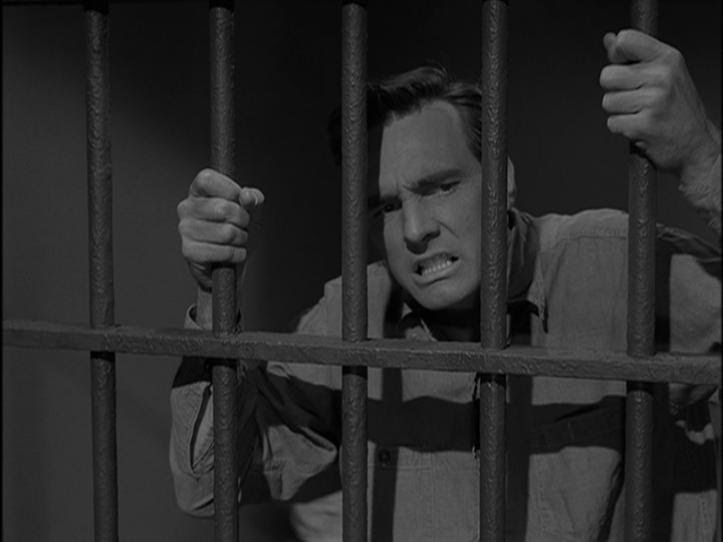
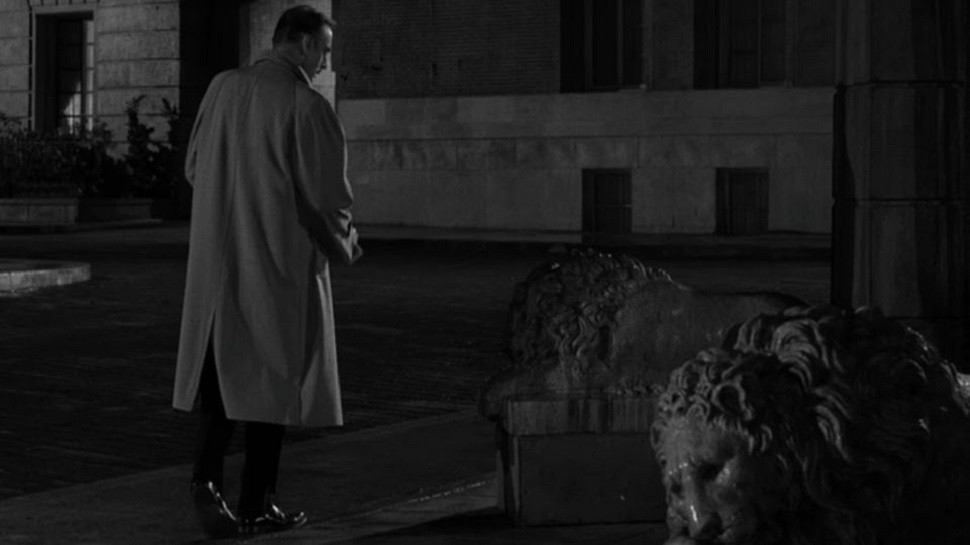

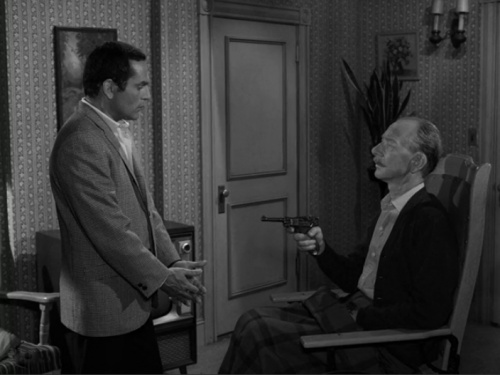
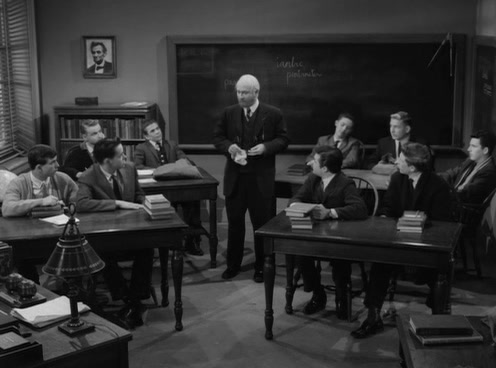
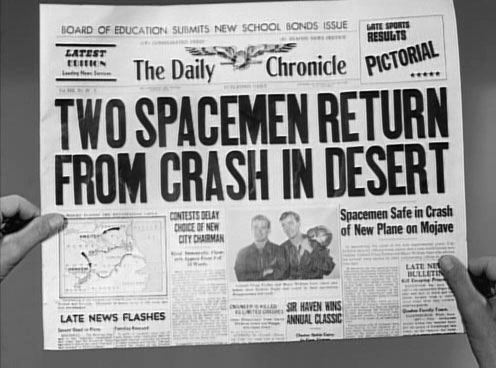
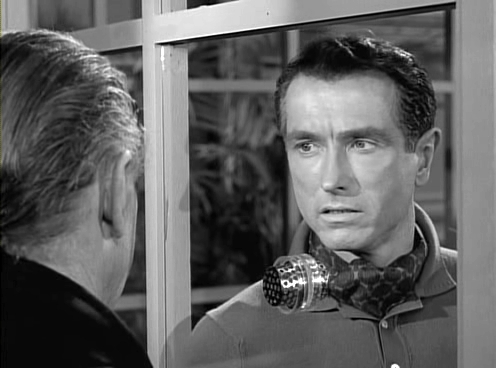
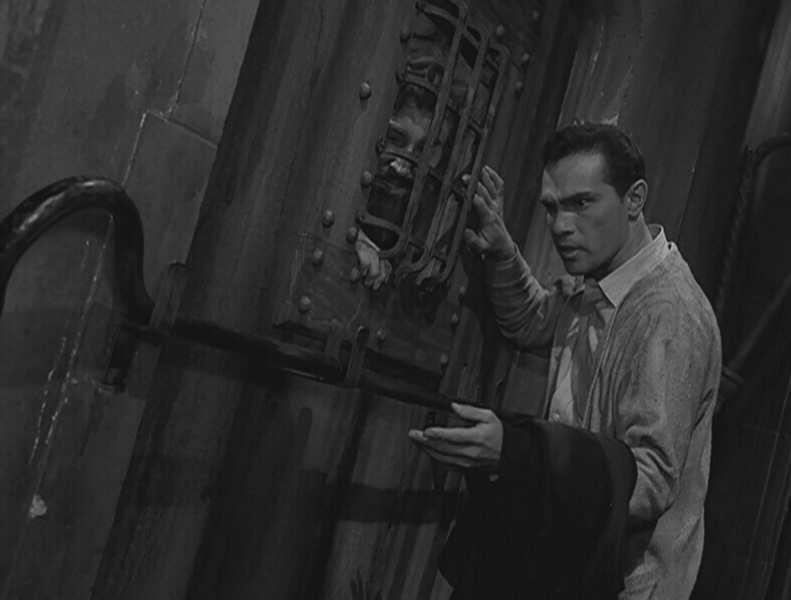
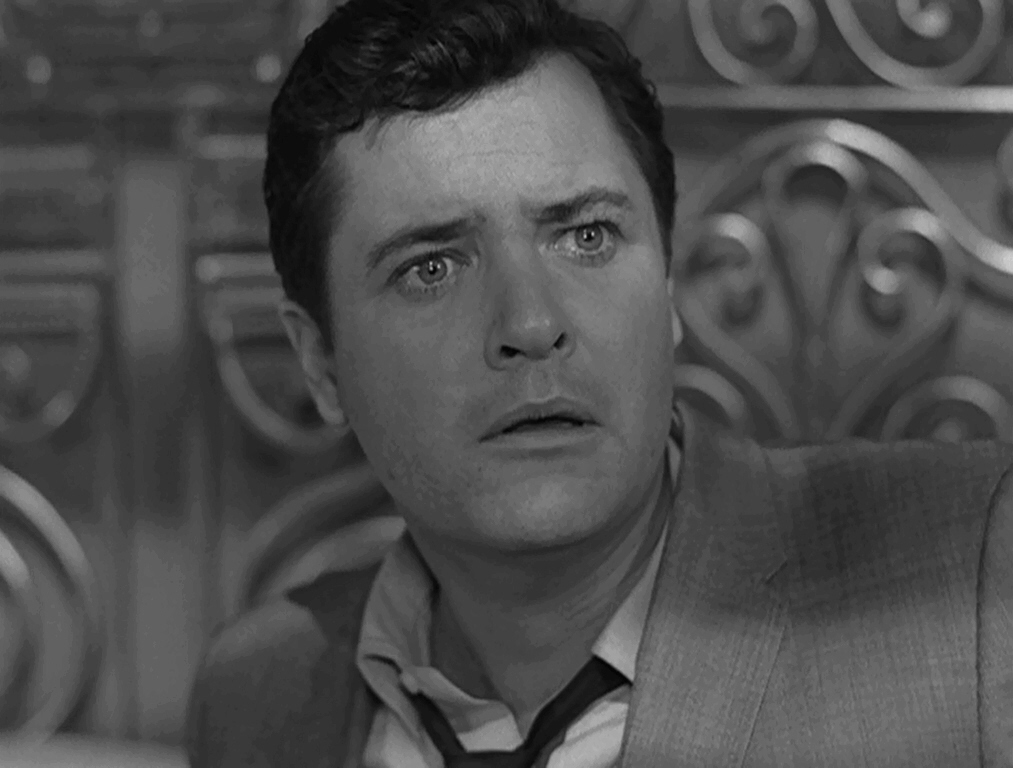
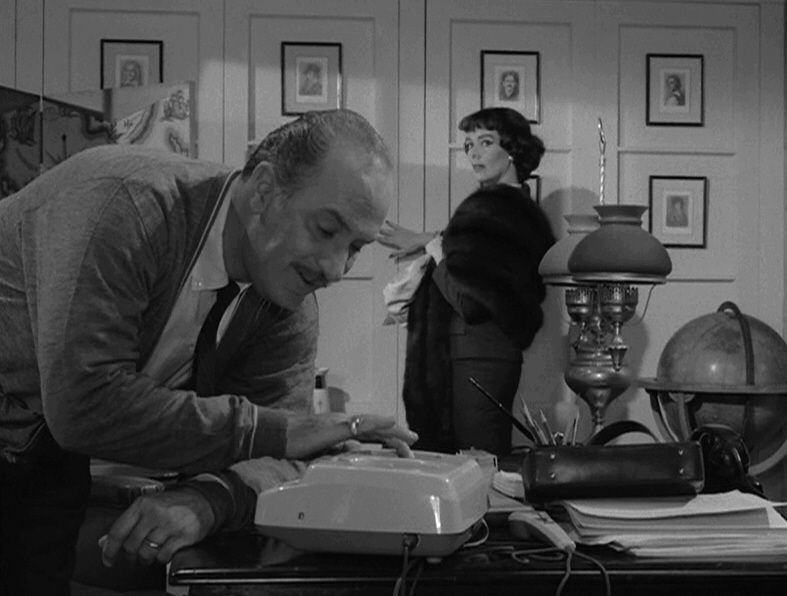
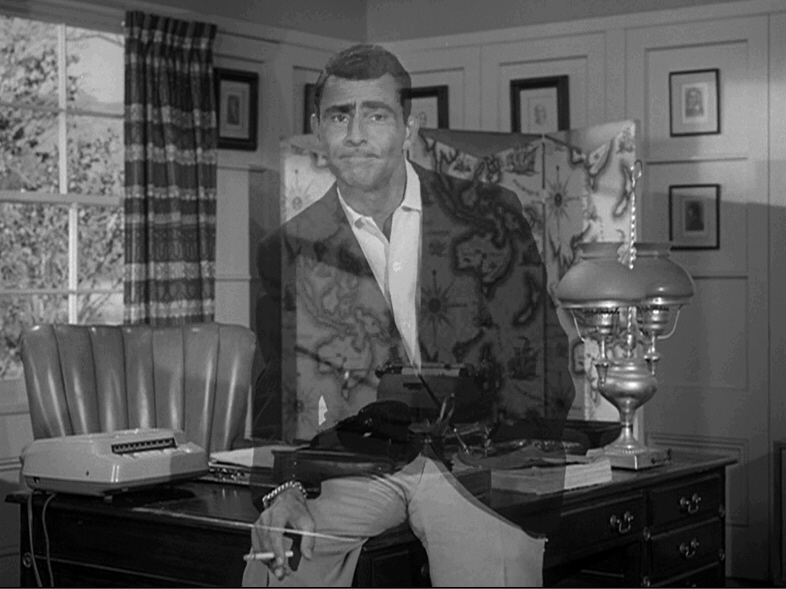



That last one reminds me of the strange movie Ruby Sparks. http://www.imdb.com/title/tt1839492/